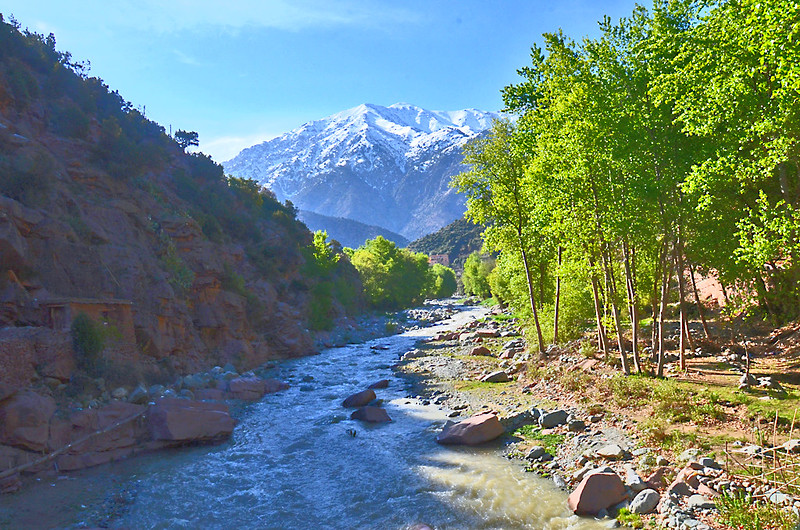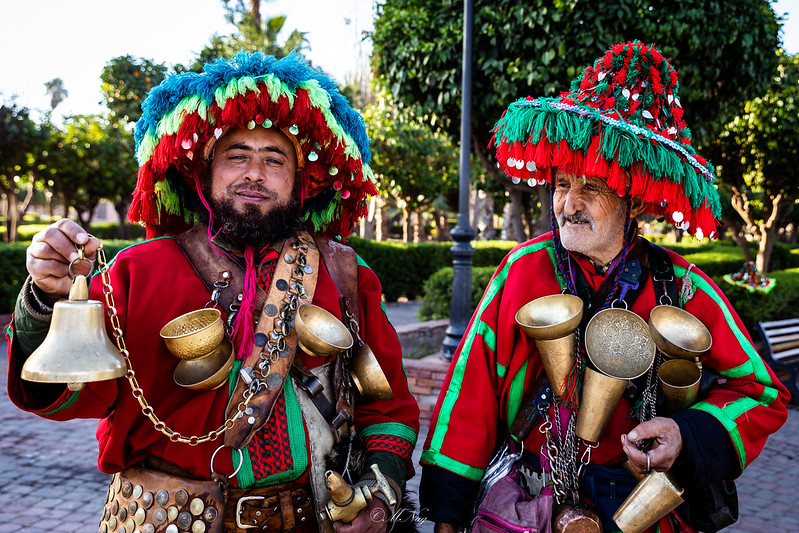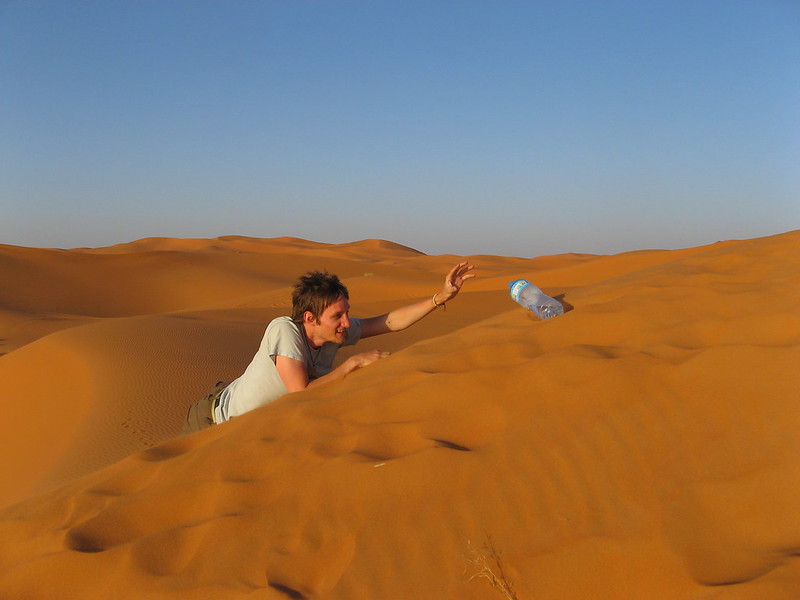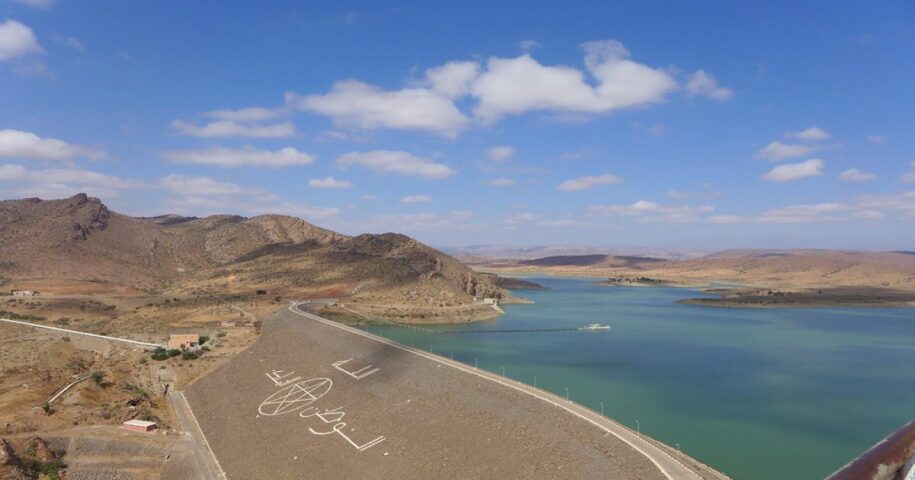It shouldn’t be a surprise that a lot of Moroccans drink tap water when they’re moving. Morocco has some of the cleanest water sources in the world. It gets its water from natural lakes and mountain streams. But the question still stands: Can You Drink Tap Water In Morocco as a tourist? This piece will go into more detail about this subject by looking at where the water comes from, how it is controlled, and whether it is safe to drink. We’ll also give you safety advice, like how to clean your drinking water and whether it’s safer to bring bottled water with you in Morocco.
Where Does The Tap Water In Morocco Come From?
Most of the drinking water in Morocco is sourced from seven rivers originating mainly in the Atlas Mountains, along with dams and groundwater. 69% of this water is sourced from these rivers and dams, while 31% comes from groundwater. The seven rivers are the Loukkos River, the Moulouya River, the Sebou River, the Bou Regreg River, the Oum Er-Rbia River, the Tensift River, and the Souss-Massa-Drâa basin. These rivers provide an important source of potable water for Morocco’s population.

However, Morocco is forecasted to receive less rainwater in future years which means that there may not be enough natural sources to meet its increasing demand for water. To overcome this challenge, Morocco has begun looking towards the desalination of seawater as a sustainable solution to supply its growing needs for drinking water, industry, and mining. While it may be possible to drink tap water in some parts of Morocco where there are reliable infrastructure systems in place for supplying safe drinking water; caution should still be exercised when consuming tap water due to potential contamination risks from other sources such as industrial waste or sewage runoff.
Who Regulates The Tap Water In Morocco?
Regulatory oversight of tap water in Morocco is primarily conducted by the Ministry of Public Health, ONEP, and the National Office for Drinking Water. These organizations are responsible for overseeing quality control for drinking water supply networks in urban areas and rural municipalities. To ensure that the public has access to safe drinking water, they plan, build, and operate treatment facilities that transport the primary sources such as reservoirs and canals to local companies or directly to end users. Additionally, these organizations also monitor wastewater management.
Moreover, sixteen autonomous inter-communal state-owned companies are placed under the Ministry of Interior and supervised by a Directorate for state-owned services. These companies take charge of distributing water among municipalities and ensuring it meets certain standards set by their regulatory bodies. Therefore, with an effective system of regulation in place backed up by competent authorities like ONEP and the Ministry Of Public Health, people can be assured that tap water in Morocco is drinkable safely.
Is The Tap Water In Morocco Safe To Drink?
The official stance is that the quality of tap water in Morocco is safe for locals, however, trust in it has been undermined by incidents of contamination. For foreigners, it is advisable to drink mineral water, to avoid any doubts. The government has been slow to react and often lacked transparency in communication regarding water quality issues. Reports have highlighted elevated levels of nitrates as a potential health risk over time. To ensure safe drinking water, it is important to take steps to monitor and maintain the public water systems:
- Regularly test for contaminants
- Improve infrastructure and maintenance protocols
- Increase public awareness about water safety
- Identify and reduce sources of pollution that can contaminate water.

Based on the potential water quality issues in Morocco a water filter is definitely a good idea. There are lots of alternatives out there ranging from expensive under-the-sink reverse osmosis to cheap Brita carafes.
What’s The Best Water Filter For Tap Water in Morocco?
Given the potential for water contamination in Morocco, there is a need to consider the most effective method of filtration to ensure safe drinking water. A high-quality activated carbon filter such as EcoPro by TAPP Water is one of the best options for this purpose, as it can remove substances like chlorine by-products, pesticides, herbicides, nitrates, and other contaminants from industrial spillage and pipe corrosion. Activated carbon filters are also known to be superior when it comes to improving taste and odor. These filters come in several types such as under-the-sink reverse osmosis systems or Brita carafe pitchers. The latter may be more cost-effective but offer less filtration performance than an under-the-sink system. To make sure that tap water in Morocco is safe to drink, making sure you have a good quality filter installed is essential for both safety and improved taste.
Is Bottled Water Safe To Drink In Morocco?
Consumers should be aware that bottled water may not necessarily provide the same safety assurances as tap water in Morocco. Though it is often assumed to be a safer source of drinking water than tap, many international brands of bottled water have been found to contain microplastics, hormones, and heavy metals. This means that even if one does not trust the safety of tap water in Morocco, they may still be at risk with bottled alternatives. Furthermore, bottled water can be up to 100 times more expensive than tap or filtered tap water. This cost difference adds up quickly and puts an additional strain on household budgets without providing any additional benefits. Additionally, the need for storage and disposal of large amounts of plastic bottles has environmental repercussions as well.

Conclusion
The tap water in Morocco is not ideal for drinking. Although various regulatory agencies are in place, the quality of the water can still be a concern due to factors such as pollution and aging infrastructure. For this reason, it is beneficial to purchase a water filter or drink bottled water when in Morocco. A good option for a filter would be one that utilizes reverse osmosis technology which efficiently removes contaminants from water. Additionally, it is important to ensure that any bottled water purchased has been stored correctly and remains sealed until consumption; otherwise, there is no guarantee of its purity. Ultimately, while tap water may be available throughout the country, it is wise to err on the side of caution and invest in a reliable filtration system or opt for bottled water instead.
FAQ
Generally speaking, tap water in Morocco is not very safe for Tourists to drink in Morocco. Therefore, it is advisable to drink mineral water instead.
You can use the Tap Water in Morocco to brush your teeth, just make sure you don’t drink it.
Tap water in Chefchaouen comes from the surrounding landscapes and it is in general safe to drink for foreigners and locals alike.
The water in Marrakech comes from clean sources, however, it is advisable to drink bottled mineral water to avoid any doubts.
Yes, you can have ice drinks in Morocco, just make sure the ice comes from mineral water and not tap water.
Bottled mineral water costs around 5 to 7 Moroccan Dirhams per liter in normal shops, however, it can cost up to 15 Moroccan Dirhams in cafes and restaurants.


Leave a Reply